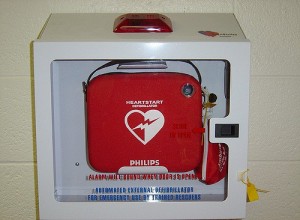WESTFIELD—When it comes to saving a life, adequate and appropriate training is key.
That is why Baystate Noble Hospital is hosting CPR classes for the public the second Saturday of each month from 8 a.m. to 1 p.m., as well as additional classes for healthcare providers. Those who attend one of the classes can learn how to perform CPR, first aid and automated external defibrillator (AED) use, thus preparing them to possibly save a life.
The hospital hopes that the program, which costs $60 and licenses participants for CPR and first aid for two years, will help to increase the amount of people who know the lifesaving maneuvers, which can greatly increase someone surviving a significant cardiac event.
“The most important piece of the entire chain of survival is immediate bystander CPR, that is the most important piece, hands-only CPR and early access to defibrillation,” Chuck Margarites, director of critical care services and the American Heart Association (AHA) training center coordinator, said.
“The thing about cardiac arrest is one person can make a difference,” he said. “It’s important to get early CPR and early AED use.”
In studies done on cardiac arrests—the event where the heart stops circulating blood—Margarites said that with every minute that passes, the chances of survival dwindle significantly.
“With every minute, you are looking at a decrease in survivability of 7 to 12 percent,” he said.
This means that if someone witnesses a cardiac arrest, it is critical that they are CPR trained so they can provide effective CPR, even if it’s hands-only, like the AHA has been promoting for the past several years. With the program at Noble though, participants will not only learn hands-only CPR, but they also learn about how to properly assist in breathing and AED use.
For those unfamiliar, AEDs provide electrical shocks that are specifically designed to help correct the heart’s rhythms, which are disrupted during cardiac arrest. When used appropriately, AEDs can help to “restart” the heart by getting it back to a circulatory rhythm.
For more information or to sign up, you can call the training center at Noble Hospital at (413)568-2811, extension 5937.


